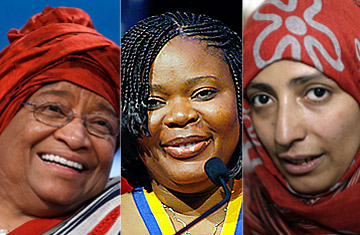
Liberian President Ellen Johnson Sirleaf, Liberian activist Leymah Gbowee and Yemeni protest leader Tawakul Karman, winners of the 2011 Nobel Peace Prize
At a campaign stop in Bong County in late September, it was clear where Liberian President Ellen Johnson Sirleaf has had the most profound influence in postconflict Liberia. The young girls lining the dusty rural roads to get a glimpse of their heroine — who managed to defy her 73 years by jumping into and out of her SUV to greet them — chanted for "Mama Ellen" and wore shirts reading "Ellen's Girl Brigade." As she enters the first round of election voting on Oct. 11, Johnson Sirleaf — running for a second term in the executive mansion — will need their support.
Although the Nobel Peace Prize win — which she shares with her compatriot Leymah Gbowee and Yemen's Tawakul Karman — will provide a boost, her celebrity standing in the international community perhaps trumps growing concerns at home about her soft stance on corruption and past association with dictator Charles Taylor.
Africa's first female President has spent the past five years working to bring democratic peace and stability to Liberia and leveraging
relationships with friends in the global community — including
U.S. Secretary of State Hillary Clinton — to put Liberian women's issues in
the spotlight. In a recent interview, she told TIME that her education
initiatives, namely mandatory free elementary schooling for all
children, were her legacy. But the most famous woman in Liberian
history remains an enigma. "She's no-nonsense," says a State
Department official who works with Johnson Sirleaf. "She has a sense of humor,
and she doesn't have a sense of self-importance." And she's "Mama Ellen" on the home front too. The day before campaigning in Bong, she had
returned from a whirlwind one-night trip to Connecticut to visit her son.
— Karen Leigh
Leymah Gbowee
Speaking at the Oslo Freedom Forum in May, clad in a colorful African dress, Liberian peace activist Leymah Gbowee said that "the road to freedom is long, the cost of freedom is high [and] the fight for freedom is not for the fainthearted and the pessimists." The mother of five trained as a trauma counselor and worked with former child soldiers during Liberia's first civil war, which lasted from 1989 to 1996. She then used her own brand of woman power to help topple the warlord Charles Taylor and bring that freedom to her countrymen.
Gbowee's female followers, in their signature white T-shirts, would regularly gather in Monrovia to lead protests. By organizing a sex strike — during which women refused to have sexual relations with men until the end of the civil war — she forced a meeting with Taylor that opened the gates to conflict-ending talks. Many believe that without her actions, peace would not have come when it did. Now she is the executive director of the Ghana-based NGO Women Peace and Security Network Africa and is a founding member of the Women in Peacebuilding program, both of which will receive significant boosts in exposure with Gbowee's Nobel win.
In 2008, Gbowee was thrust into the international spotlight as the star of Pray the Devil Back to Hell, a film about women fighting for peace during the war, which took top-documentary honors at the Tribeca Film Festival. And she is currently touring the U.S. to promote her memoir, Money Be Our Powers. "Money, greed, ethnicity, absolute power," she told the audience in Oslo. "There's nothing to make people do what they did to the children of Liberia."
— Karen Leigh
Tawakul Karman
Tawakul Karman hardly looks like the leader of a revolution — nor, for that matter, like most past recipients of the Nobel Peace Prize. Dressed most days in a simple long abaya, or coverall, with a headscarf — usually pink — the mother of three has become a familiar sight in Yemen's capital, Sana'a, racing between her family and the massive street protests. It would be hard to find a more stark contrast with the dictator under whose rule Karman has lived all her life: the dour 69-year-old President Ali Abdullah Saleh.
Karman, 32, joined Yemen's weekly Tuesday protests back in 2007, long before the world became transfixed by the youth of the Arab Spring. Then came the Tunisian and Egyptian revolutions early this year. Those events, says Karman, convinced her to intensify her activism. She was, it turned out, a natural leader. Karman has been central to organizing Yemen's protest movement, brushing off regular death threats against her and refusing to be cowed by her regular stints in jail. When she is not in prison herself, she works to free her fellow activists, in her role as head of Yemen's human-rights organization Women Journalists Without Chains.
Aside from her canny organizational skills, it is her visceral fury against Yemen's leader that has earned Karman international recognition. In a desperately poor country where child brides of age 10 are not uncommon, she ditched her full-face veil as she increasingly took the podium at protests. She provided a pitch-perfect tone of frustration for a generation straining for freedom. "With two civil wars, an al-Qaeda presence and 40% unemployment, what else is President Saleh waiting for?" she told the Guardian in March. "He should leave office now." Saleh — who is winning no prizes these days — is clinging to power, vowing to crush Karman's protest movement. But that is not stopping Karman, who will no doubt repeat her demand for Saleh to leave when she collects her gold medallion in Oslo in December.
— Vivienne Walt
